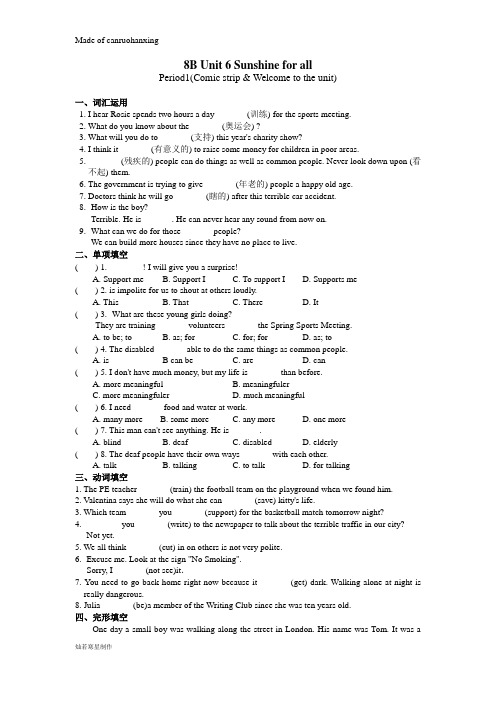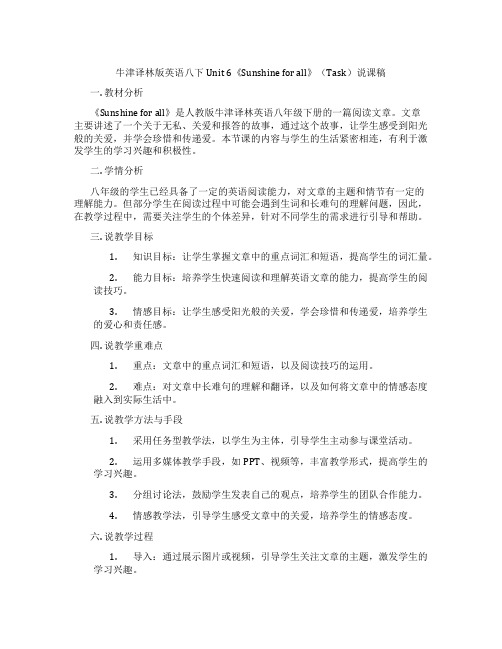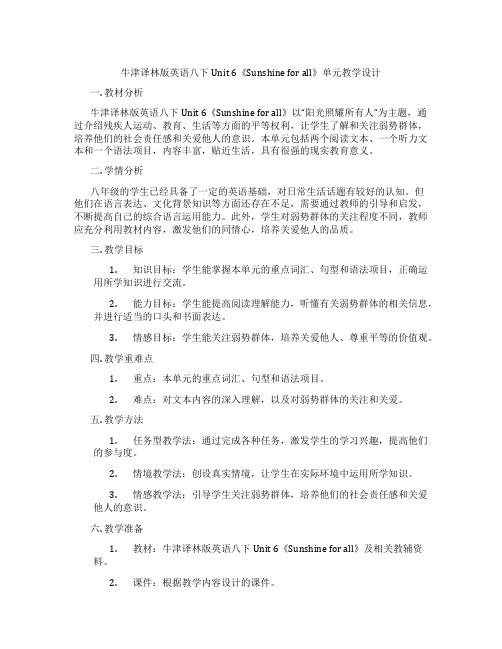2020春牛津译林版英语八下Unit6Sunshineforallintegrastedskills
牛津译林版八年级英语下册《Unit 6 Sunshine for all Integrated skills》课件 5

Have a discussion
Do you want to be a volunteer teacher in the
future? Why?
Speak up: How can we help people in our daily lives
Listen to the conversation and list the ways they are talking about to help people in our daily life.
1. What is Judy? a A college student. b A primary school teacher.
2. Where is she going? a South-west China. b North-west China.
3. Why is she going there? a For a volunteer project. b For a training plan.
Judy thinks it is meaningful for college students to learn more about (11) _th_e__p_o_o_r_a_r_e_a_s of China. It is also helpful of them to (12) ___te_a_c_h__ the children there. In this way, they can help local people improve their lives.
Do you know volunteer teacher? Now let’s watch a video about it.
A1
Peter’s cousin Judy is telling him about a volunteer project. Listen carefully. Help Peter answer the following questions by choosing the correct answers.
牛津译林版八下《Unit 6 Sunshine for all Integrated skills》教案

Unit 6 Sunshine for allTeaching aims:1.Aims of the knowledge:Master some words and phrases.2.Aims of the a bilities:(1)Improve the ability of listening, re ading and speaking.(2)Learn to talk about how to help people in need.3.Aims of the emotion:Know to help people in need in our daily life.Teaching emphasis:(1)Improve the ability of listening, reading and speaking.(2)Learn to talk about how to help people in need.Teaching diffic ulties:(1)Improve the ability of listening, reading and speaking.(2)Learn to talk about how to help people in need.Teaching procedure:Step1 Presentation1.Show pictures of our own school and pictures of children in mountain areas.2.Show a map of China to learn the new words: north-west, south-west.3.Ask the students : How can we help them?4.Tell students that volunteer teachers can help them and learn the new words pro ject.Step2 Listening1.Listen to the tape and finish Part A1.2.Check the answers.3.Listen to the tape and finish Part A2.4.Check the answe rs.5.Finish Part A3 with the information in Part A1 and A2.6.Check the answers and read together.Step3 Practice1.Make an interview to talk about Judy’s life.2.Let students to talk about if you would like to be a volunteer teacher in the future?3.Enjoy a video to show the i mportance of being a volunteer teacher.4.Discus s: As our Middle school students, what can we do to help them?Step4 PresentationThere are many people in trouble. We should help them. Ask students who need help? How can we help people in our daily lives?Step5 Speak up1.Listen to the dialogue and answer how to help people in need.2.Read after the tape.Step6 DiscussionDiscuss more ways to help people in need.Step7 ConclusionTo help others is to help ourselves. If everyone gives a little l ove, the world will be more beautiful!Step8 HomeworkMake up a new dialogue on how to help people in need and write down.。
牛津译林版英语八下 Unit 6 Sunshine for all

8B Unit 6 Sunshine for allPeriod1(Comic strip & Welcome to the unit)一、词汇运用1. I hear Rosie spends two hours a day_______ (训练) for the sports meeting.2. What do you know about the_______ (奥运会) ?3. What will you do to_______ (支持) this year's charity show?4. I think it_______ (有意义的) to raise some money for children in poor areas.5. _______ (残疾的) people can do things as well as common people. Never look down upon (看不起) them.6. The government is trying to give_______ (年老的) people a happy old age.7. Doctors think he will go_______ (瞎的) after this terrible car accident.8. -How is the boy?-Terrible. He is_______. He can never hear any sound from now on.9. -What can we do for those_______ people?-We can build more houses since they have no place to live.二、单项填空( ) 1. -_______! I will give you a surprise!A. Support meB. Support IC. To support ID. Supports me( ) 2. is impolite for us to shout at others loudly.A. ThisB. ThatC. ThereD. It( ) 3. -What are these young girls doing?-They are training_______ volunteers_______ the Spring Sports Meeting.A. to be; toB. as; forC. for; forD. as; to( ) 4. The disabled_______ able to do the same things as common people.A. is B can be C. are D. can( ) 5. I don't have much money, but my life is_______ than before.A. more meaningfulB. meaningfulerC. more meaningfulerD. much meaningful( ) 6. I need_______ food and water at work.A. many moreB. some moreC. any moreD. one more( ) 7. This man can't see anything. He is_______.A. blindB. deafC. disabledD. elderly( ) 8. The deaf people have their own ways_______ with each other.A. talkB. talkingC. to talkD. for talking三、动词填空1. The PE teacher_______ (train) the football team on the playground when we found him.2. Valentina says she will do what she can_______ (save) kitty's life.3. Which team_______ you_______ (support) for the basketball match tomorrow night?4. - _______ you_______ (write) to the newspaper to talk about the terrible traffic in our city?-Not yet.5. We all think_______ (cut) in on others is not very polite.6. -Excuse me. Look at the sign "No Smoking".-Sorry, I_______ (not see)it.7. You need to go back home right now because it_______ (get) dark. Walking alone at night is really dangerous.8. Julia_______ (be)a member of the Writing Club since she was ten years old.四、完形填空One day a small boy was walking along the street in London. His name was Tom. It was acold winter day in 1900. That day he could have no breakfast 1 lunch. He wanted to buy bread, but he didn't 2 any money.His father died when he was very young. His mother was often very ill, so she could not 3 Tom and his brother, Mike. They had to work to help their sick mother.He was small 4 his dream was very big. His wish was to be a great man in the world of film. So he worked very hard on singing and dancing. Then, one day a man came to him and asked, " 5 for my film?" "Certainly," he answered. And he did his 6 in it. Many people said, "We have never seen 7 interesting film."Thirty years 8 , this same boy was among the most famous people in the world. He made many good 9 . A lot of people liked 10 .( )1. A. and B. or C. so D. but( )2. A. need B. look C. have D. see( )3. A. look after B. look for C. look at D. look like( )4. A. but B. or C. and D. then( )5. A. Do you work B. Do you enjoyC. Would you workD. Do you like( )6. A. good B. better C. best D. well( )7. A. such B. so a C. so D. such an( )8. A. before B. past C. later D. after( )9. A. cards B. cakes C. games D. films( )10. A. it B. them C. one D. that五、阅读理解The most common disease in the world is the cold. It often starts with a sore throat(噪子痛).You sneeze and your nose runs. You usually have a headache too. Often you have a cough. It's not a serious disease, but you can feel quite ill.There isn't a cure(特效药)for a cold,but you can take medicine(药)to make you feel better.It is good to rest, and to出ink a lot of water, t∞.A doctor Once told me“With the right medicine, a cold will last for seven days. With no medicine, it will still go on for a whole week!"Where does our medicine come from? A long time ago, people understood that some plants made them feel better. They ate certain parts of plants, 1ike the leaves, the fruit, or the seeds (籽).For example, the juice of lemons makes a sore throat feel better.In modern times, scientists have studied these plants, and found out what chemicals(化学物质)are in them. Much of our medicine today is made from those chemicals.There are some diseases which we can't cure(治愈)yet. And nobody has found a cure for old age. But because of modern medicine, most of the people live longer than their grandparents.( )1.Which of the following is NOT true about the cold?A. The cold can last a week.B. You’ll have a running nose when having a cold.C. We may catch a cold sometimes.D. Some medicine can help you cure the cold much more quickly.( )2.When you have a cold, you'd better notA. drink much waterB. have more sleepC. drink the juice of lemonsD. do much exercise( )3.What can we learn from the text?A. Some of the plants are medicine them selves.B. We can cure old age now.C. Every one of us lives much longer than our grandparents.D. All the medicines are made from chemicals in the plants.六、翻译句子1.他们正受训为奥运会志愿者。
2019-2020年春牛津译林版英语八年级下册unit 6《sunshine for all》单元教案.doc

Unit 6 Sunshine for allWelcome to the unitTeaching aims:To understand the meanings of special groups of people.To cultivate students’sympathy and the ability of taking care of others.Teaching steps:Step 1 New wordsPresent some pictures and teach the new words.Step 2 Free talk1.Ask the students to talk about the questions below:Have you ever been a volunteer?Have you ever helped people who need help?Step 3 Welcome to the unit1.The Class 1, Grade 8 students have found some pictures of people who need help. Write the correct words under them. Then put a tick in the boxes if you have ever helped these people.blind, deaf, disabled, elderly, homeless, poorKeys: 1. disabled 2. poor 3. blind4. elderly5. homeless6. deaf2.Amy and Daniel are talking about people who need help. Listen to the recordingand answer the following question:How can we help homeless people?Keys: Give them food and clothes. Write to the local government.3. Work in pairs and discuss the people in Part A. Use the conversation in below as amodel.Amy: What are homeless people, Daniel?Daniel: Homeless people don’t have their own places to live.Amy: How can we help homeless people?Daniel: We can give them food and clothes.Amy: Are there any other ways to help them?Daniel: Yes. We can write to the local government. They can provide special places for homeless people to stay.Step 4 Free talk1.Ask the students to talk about the question:Would Eddie and Hobo like to help people in need?Step 5 Comic strip1. Listen and answer the questions.What is Hobo doing?Will Eddie support him?How does Hobo want Eddie to help?Keys: 1. He is training to be a volunteer for the Olympic Games.2. Yes, he will.3. He needs some more food to eat at work.2. Act the dialogue out.Step 6 Language points1. I’m training to be a volunteer for the Olympic Games.train v.训练;培训e.g. If you train hard, you'll make a good footballer.你要刻苦训练就能成为优秀的足球运动员。
牛津译林版英语八下Unit 6《Sunshine for all》(Task)说课稿

牛津译林版英语八下Unit 6《Sunshine for all》(Task)说课稿一. 教材分析《Sunshine for all》是人教版牛津译林英语八年级下册的一篇阅读文章。
文章主要讲述了一个关于无私、关爱和报答的故事,通过这个故事,让学生感受到阳光般的关爱,并学会珍惜和传递爱。
本节课的内容与学生的生活紧密相连,有利于激发学生的学习兴趣和积极性。
二. 学情分析八年级的学生已经具备了一定的英语阅读能力,对文章的主题和情节有一定的理解能力。
但部分学生在阅读过程中可能会遇到生词和长难句的理解问题,因此,在教学过程中,需要关注学生的个体差异,针对不同学生的需求进行引导和帮助。
三. 说教学目标1.知识目标:让学生掌握文章中的重点词汇和短语,提高学生的词汇量。
2.能力目标:培养学生快速阅读和理解英语文章的能力,提高学生的阅读技巧。
3.情感目标:让学生感受阳光般的关爱,学会珍惜和传递爱,培养学生的爱心和责任感。
四. 说教学重难点1.重点:文章中的重点词汇和短语,以及阅读技巧的运用。
2.难点:对文章中长难句的理解和翻译,以及如何将文章中的情感态度融入到实际生活中。
五. 说教学方法与手段1.采用任务型教学法,以学生为主体,引导学生主动参与课堂活动。
2.运用多媒体教学手段,如PPT、视频等,丰富教学形式,提高学生的学习兴趣。
3.分组讨论法,鼓励学生发表自己的观点,培养学生的团队合作能力。
4.情感教学法,引导学生感受文章中的关爱,培养学生的情感态度。
六. 说教学过程1.导入:通过展示图片或视频,引导学生关注文章的主题,激发学生的学习兴趣。
2.阅读理解:让学生快速阅读文章,回答相关问题,提高学生的阅读速度和理解能力。
3.词汇学习:讲解文章中的重点词汇和短语,让学生学会运用这些词汇。
4.深度阅读:引导学生分析文章中的长难句,提高学生的翻译能力。
5.小组讨论:让学生分组讨论文章的主题和情感,培养学生的团队合作和表达能力。
牛津译林版英语八下Unit 6《Sunshine for all》单元教学设计

牛津译林版英语八下Unit 6《Sunshine for all》单元教学设计一. 教材分析牛津译林版英语八下Unit 6《Sunshine for all》以“阳光照耀所有人”为主题,通过介绍残疾人运动、教育、生活等方面的平等权利,让学生了解和关注弱势群体,培养他们的社会责任感和关爱他人的意识。
本单元包括两个阅读文本、一个听力文本和一个语法项目,内容丰富,贴近生活,具有很强的现实教育意义。
二. 学情分析八年级的学生已经具备了一定的英语基础,对日常生活话题有较好的认知。
但他们在语言表达、文化背景知识等方面还存在不足,需要通过教师的引导和启发,不断提高自己的综合语言运用能力。
此外,学生对弱势群体的关注程度不同,教师应充分利用教材内容,激发他们的同情心,培养关爱他人的品质。
三. 教学目标1.知识目标:学生能掌握本单元的重点词汇、句型和语法项目,正确运用所学知识进行交流。
2.能力目标:学生能提高阅读理解能力,听懂有关弱势群体的相关信息,并进行适当的口头和书面表达。
3.情感目标:学生能关注弱势群体,培养关爱他人、尊重平等的价值观。
四. 教学重难点1.重点:本单元的重点词汇、句型和语法项目。
2.难点:对文本内容的深入理解,以及对弱势群体的关注和关爱。
五. 教学方法1.任务型教学法:通过完成各种任务,激发学生的学习兴趣,提高他们的参与度。
2.情境教学法:创设真实情境,让学生在实际环境中运用所学知识。
3.情感教学法:引导学生关注弱势群体,培养他们的社会责任感和关爱他人的意识。
六. 教学准备1.教材:牛津译林版英语八下Unit 6《Sunshine for all》及相关教辅资料。
2.课件:根据教学内容设计的课件。
3.教学资源:有关弱势群体的图片、视频等。
七. 教学过程1.导入(5分钟)利用图片或视频引入弱势群体的话题,激发学生的兴趣,引导学生思考和讨论。
2.呈现(10分钟)呈现本节课的主题,让学生明确学习目标。
2020春牛津译林版英语八下Unit 6《Sunshine for all》(integrated skills)ppt课件1

14.她将呆在那里多长时间? 三个月。
How long will she stay there? For three months. 15.通过写邮件/ 通过打电话保持联系
keep in touch by writing emails/
by talking on the phone 16.在一个山区工作work in a mountain area 17. 住在很远的村子里 live in villages far away 18. 课后教他们歌曲teach them songs after class 19. 在我们的日常生活中怎样帮助人?
What can you see in the pictures? What can we do to help those students?
• Have you or your family ever been a volunteer?
• How was it?
Working in a mountain area
How can we help people in our daily lives? 20.节省我们的零花钱 save our pocket money 21.把它捐赠给那些需要的人
donate it to those in need 22. 在社区中心 at community centres
23. 在公共汽车上给老人让座是好的。 It’s good to give our seats on the bus to the elderly 24.组织你的观点 organize your ideas 25. 介绍、正文、结尾
a For one year.
b For three months.
牛津译林版英语八下Unit6《Sunshineforall》(welcom)说课稿

牛津译林版英语八下Unit 6《Sunshine for all》(welcom)说课稿一. 教材分析《Sunshine for all》是牛津译林版英语八年级下册Unit 6的一篇课文。
本篇文章主要介绍了一位名叫Simon的男孩,他在一次意外中失去了双臂,但通过坚持不懈的努力,学会了用双脚做很多事情,并成为了一名优秀的运动员。
文章传递了积极向上、勇敢面对困难的精神,旨在培养学生面对困境时的乐观态度和自强不息的品质。
二. 学情分析八年级的学生已经具备了一定的英语基础,能够听、说、读、写一些简单的英语句子。
但他们在阅读理解、词汇积累和语法运用方面仍有待提高。
此外,学生的学习兴趣和积极性对英语学习成果有很大影响。
因此,在教学过程中,需要关注学生的个体差异,激发他们的学习兴趣,提高他们的参与度。
三. 说教学目标1.知识目标:学生能够掌握课文中的关键词汇和语法结构,理解文章大意。
2.能力目标:学生能够流畅地朗读课文,提高阅读理解能力,学会运用所学知识进行口语表达。
3.情感目标:学生受到文章中主人公Simon的自强不息、积极面对困难的精神感染,培养自己面对困境时的乐观态度。
四. 说教学重难点1.重点:课文的理解和词汇、语法的学习。
2.难点:正确运用所学知识进行口语表达,深入体会文章所传递的精神。
五. 说教学方法与手段1.教学方法:采用任务型教学法,让学生在完成任务的过程中,自然而然地掌握知识。
2.教学手段:利用多媒体课件、图片、音频等辅助教学,提高学生的学习兴趣和参与度。
六. 说教学过程1.导入:通过展示一张阳光明媚的图片,引导学生猜测本文主题,激发学习兴趣。
2.自主学习:让学生快速阅读课文,回答简单问题,了解文章大意。
3.精讲细练:针对课文中的关键词汇和语法结构进行讲解,让学生充分理解并学会运用。
4.小组讨论:学生分组讨论,探讨文章主人公Simon面对困难时的态度和做法,培养学生的团队协作能力。
5.口语表达:让学生结合所学知识,进行角色扮演,模拟课文场景,提高口语表达能力。
- 1、下载文档前请自行甄别文档内容的完整性,平台不提供额外的编辑、内容补充、找答案等附加服务。
- 2、"仅部分预览"的文档,不可在线预览部分如存在完整性等问题,可反馈申请退款(可完整预览的文档不适用该条件!)。
- 3、如文档侵犯您的权益,请联系客服反馈,我们会尽快为您处理(人工客服工作时间:9:00-18:30)。
年级:初二主备:吴蕴审核:潘丽娟时间:2014.4.28 课题:Unit6 Integrated &study skills 课型:新授课时安排:一课时学生姓名___________________ 家长签名 _____【学习目标】1.能从听力材料中获取有用的信息2.能用已掌握的信息使相关文章的意思表达完整3.能用英语谈论如何为需要的人提供帮助。
4.学会根据不同的文章内容,使用不同的布局方法。
【课前热身】背诵并默写以下单词、词组和句子:1.西南方(n ,adj &adv )south-west2.西北方(n, adj &adv )north-west3.项目,工程,课题(n)project 1.参加一个志愿者工程take part in a volunteer project 2作为一名小学教师work as a primary school teacher 3.在中国西北/西南in North-west / South-west China4.大部分学生住的远。
Most of the students live far away.5.需要走一个多小时到达学校have to walk for more than an hour to get to school6. 教他们数学teach them maths(teach sb sth ; teach sb to do sth ; teach sb how to do sb宾格代词)7.自学teach oneself sth ; teach oneself to do sth 8.给他们许多书读give them a lot of books to read9. 对大学生来说学习更多有关中国的贫困地区是有意义的。
It’s meaningful for college students to learn more about the poor areas of China.10. 教那里的孩子对他们来说也是乐于助人。
It’s also helpful of them to teach the children there.11. 用这种方式,他们可以帮助当地人提高他们的生活质量。
In this way, they can help the local people improve their lives.12.她为什么要去那儿?为了一次训练计划。
Why is she going there? For a training plan.13.在田里工作work in the fields 14.她将呆在那里多长时间?三个月。
How long will she stay there? For three months. 15.通过写邮件/ 通过打电话保持联系keep in touch by writing emails/ by talking on the phone 16.在一个山区工作work in a mountain area17. 住在很远的村子里live in villages far away 18. 课后教他们歌曲teach them songs after class19. 在我们的日常生活中怎样帮助人?How can we help people in our daily lives?20.节省我们的零花钱save our pocket money 21.把它捐赠给那些需要的人donate it to those in need22. 在社区中心at community centres 23. 在公共汽车上给老人让座是好的。
It’s good to give our seats on the bus to the elderly. 24.组织你的观点organize your ideas25. 介绍、正文、结尾introduction, main body and conclusion 26. 用不同的方法in different ways 27看到不同的人和风景see different people and sights 28了解不同的文化learn about different cultures29旅游帮助我们放松大脑。
Travelling helps our mind relax. 30. 旅游帮助我们保持健康。
Travelling helps us keep fit. 31.导致……lead to sth (lead led led)32.天空不如以前那样蓝。
Sky is not as blue as before. 33. 水不再干净Water is not clean any more.34.我们有更多糟糕的天气。
We have more bad weather . 35. 我们的环境在变得更差。
Our environment is getting worse. 36. 好的读书习惯是重要的。
Good reading habits areimportant.【学海拾贝】1.daily (adj) 意为_________. 他为那家日报撰稿。
He _______ _______ the ________ ________daily (n) 意为“日报”。
中国日报_________ __________daily =everyday (adj) 意为“每日的,日常的”,在句中做定语:日常英语________________=_______________; 日常生活________________=________-_______daily = every day (adv). 他每天来这儿。
He comes here _______ ________/ _________.2.need (n) 构成的短语:in need 意为________________; 急需……________________________;满足……的需要____________________________________.你不必再尝试了。
There’s ____________ __________ for you to try again.那家工厂急需资金。
The factory is __________ ________ _________ _________ funds. 这幢18世纪90年代的房子甚至能够满足21世纪的需要。
This house of the 1790s can even _______ _________ _______ _________ the 21st century. need (v) 有时态和人称的变化。
need /needs/deeded ____________(do) sth (否定形式)____________.need(情态动词) 需要做某事_________________(否定形式)__________________The charity aims to provide help for people ________ _________ (需要)。
现在我必须交作业吗?---Must I hand in my homework now? 不,你不必。
---No, you ___________.有的是时间,你不必着急。
There is enough time. You _________ hurry.你要好好照料你妈妈。
You _________ _________ take good care of your mother.你爸爸需要帮助吗?_______ your father _________ any help?( ) Tom ________get up a little earlier tomorrow. A. needs B. need C. need to D. needs to( ) Look! Your shirt is so dirty. It ___________.A. need washingB. need to washC. needs washingD. need wash( ) ______David______ anything to drink? A. Need,\ B. Needs,\ C. Does, need D. Do, need( )You ________to the meeting tomorrow if you have something important to do.A. needn’t to comeB. don’t need comeC. don’t need comingD. needn’t come ( ).---Must I stay at the office this afternoon? ---No, you ______.A. don’tB. needn’tC. don’t needD. can’tanizing your ideas 组织你的观点。
一篇文章经常由三部分组成:介绍、正文和结尾。
然而,我们可以根据不同的文章类型用不同的方式来组织我们的观点。
Time order 时间顺序(写一次经历或一个事件时用);Space order空间顺序(描写一个地方或一个事物时用)General to specific 从总体到细节(用这个方法时,先给出一个大体的叙述,然后用细节信息来支持主要的观点)Specific to general 从细节到总体(先用一些细节例子,然后导入我们的总体观点)【堂清巩固】1. She is going the ___________ (西北方) of China.2. The local people hope to ___________ (提高) their lives.3. We should help those people in need in our d________ life.4. Simon d__________ his pocket money to the disabled person yesterday.5. These ____________ (组织) need plenty of volunteers.( )1.The Internet is so closely connected with our ________ life. Can you imagine the life without it?A daily B. primary C. every day D. college( )2. These are my _________ shoes, not my best ones.A. every day B everyday C every-day D. each day( )3.________weather it is! We can’t go boating on the Xuanwu Lake.A. What goodB. How goodC. How badD. What bad( )4.It’s nice of you _______me with my Maths. A. help B. helping C to help D. to helping( )5.It’s important ____________. A. for you to learn Maths well B. of you to learn Maths wellC. of learning Maths well D for learning Maths well( )6.The money they have raised is used _______ the poor children in our class.A. to helpingB. helpC. helpfulD. to help( )7. By _________ local doctors and nurses, we hope _________ more patients.A. train, helpB. training, to help C training, helping D train, helping1.为何不把你的零花钱捐给需要的人呢?Why not _______ your pocket money ________ people ________ _______?2.周末在社区中心当志愿者很有意义。
